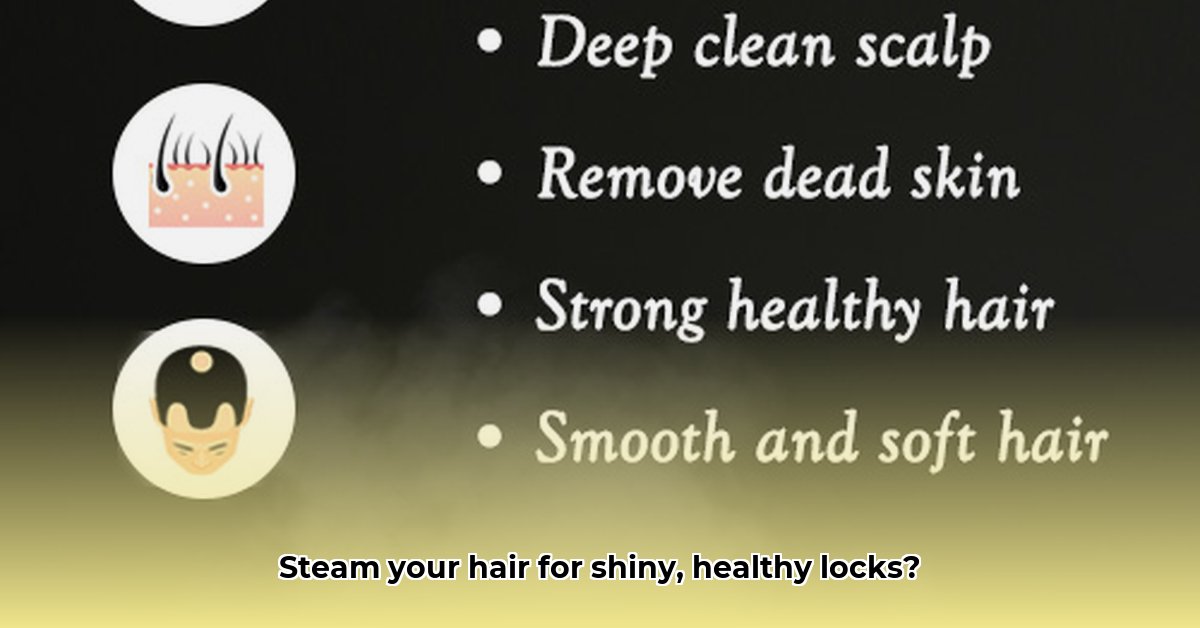
Benefits of Hair Steaming: A Deep Dive into Hydration
Want luscious, healthy hair that shines? Hair steaming might be your secret weapon! This surprisingly effective technique deeply moisturizes your hair, leaving it softer, shinier, and easier to manage. But how does it work, and is it right for you? Let's explore the science and practical application of hair steaming. We'll cover everything from creating a spa-like experience at home to addressing potential risks and customizing your routine.
How Hair Steaming Works: The Science of Hydration
Hair steaming leverages the power of moisture. Steam gently lifts the hair cuticle (the outermost layer of each strand), creating microscopic pathways. This allows your favorite conditioner or hair mask to penetrate deeply, delivering intense hydration where it's needed most. The result? Hair that's noticeably smoother, healthier, and more vibrant. Doesn't that sound amazing? Are you ready to unlock your hair's full potential?
Step-by-Step Guide to At-Home Hair Steaming
Ready to transform your hair care routine? This simple, effective method delivers salon-worthy results from the comfort of your home.
Step 1: Gathering Your Supplies
You'll need:
- A large bowl (ceramic is ideal)
- Hot (but not boiling!) water – comfortably warm is key!
- Deep conditioner or hair mask (choose one suited to your hair type)
- Large, fluffy towel
- Optional: A few drops of calming essential oils (lavender or chamomile)
Step 2: Preparing the Steam Bath
Fill your bowl with comfortably hot water. Add essential oils (if using) and test the steam with your hand to check the temperature before proceeding.
Step 3: Applying the Deep Conditioner
Apply a generous amount of conditioner or hair mask to your clean, detangled hair, focusing on the ends.
Step 4: Performing the Steam Treatment
Drape the towel over your head, creating a steam tent. Lean over the bowl, keeping your face a safe distance from the steam. Steam for 10-15 minutes. Remember, longer isn't always better.
Step 5: Cool Down and Rinse
Let your hair cool before rinsing thoroughly with cool water. This helps seal the cuticle, locking in moisture.
Step 6: Post-Steaming Pampering
Gently towel-dry and style as usual. Avoid harsh heat styling immediately after steaming.
Alternative Steaming Methods: Beyond the Bowl
While the bowl method is easy, other options exist. You can try using a shower cap after applying conditioner, or invest in a dedicated hair steamer for a more consistent steam distribution.
Potential Risks and Cautions: Prioritizing Safety
Hair steaming is generally safe, but precautions are important. Always test water temperature. If using essential oils, perform a patch test first to check for allergies. Individuals with sensitive scalps or conditions should consult a dermatologist before starting. Over-steaming can be damaging, so stick to the recommended duration.
Dr. Anya Sharma, Dermatologist at the Cleveland Clinic, cautions, "While hair steaming offers benefits, it's crucial to avoid scalding. Start with lukewarm water and gradually increase the temperature as tolerated."
Frequency and Customization: Finding Your Perfect Routine
The ideal frequency depends on your hair type and condition. Fine hair might need monthly steaming, while thicker, drier hair might benefit from weekly treatments. Listen to your hair – if it feels dry or brittle, reduce the frequency. Isn't it amazing how unique our hair is?
Maintaining Long-Term Benefits: Integrating Steaming into Your Haircare
Think of hair steaming as a supplemental treatment. Combine it with regular use of a quality shampoo and conditioner designed for your hair type. Consistent treatment and careful attention will help you achieve the most beautiful and healthy hair possible.
Conclusion: Embrace the Steam, Embrace Healthy Hair
Hair steaming offers a simple yet effective way to boost your hair's health and shine. By following these guidelines and prioritizing safety, you can unlock your hair's full potential, revealing healthier, shinier, and more manageable locks. Remember, consistency, customization, and attention to your unique hair needs are key.